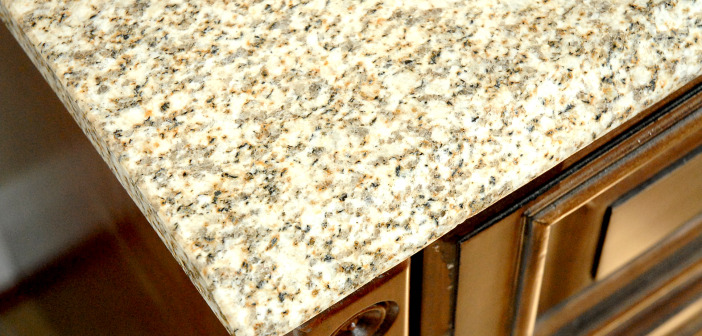Few materials beat stone for countertops. Though it is pricey, stone is beautiful, durable and able to take any amount of abuse. Many types of stone can go into making a fantastic countertop, but the following are the top four:
• Granite
Granite is an igneous rock, which means it is formed within the bowels of the earth and specifically within a volcano. This makes it exceedingly tough, but that toughness is coupled with a great beauty. Granite can come in the familiar salt-and-pepper pattern but can also come in shades of blue, violet, red, brown and green. It is probably the most popular type of stone countertop. Though it’s by no means cheap, granite is no longer out of reach for most people. This is due to advances in technology that have made it easier to cut and shape slabs of granite.
According to Premium Granite, LLC, “Like most types of stone, most granite needs to be sealed every few years or so because it’s porous.” It shouldn’t be cleaned with harsh chemicals and people should avoid putting screaming hot pots and pans directly on it. Other than that, a well-kept granite countertop should last longer than the house.
• Marble
Unsurpassed in its beauty, marble is a metamorphic rock, which means that it was formed from another type of rock over eons. In the case of marble, the stone was limestone. Light colored marble seems to hold light within it, and it is cool to the touch. This makes it ideal for pastry-making. Marble’s one drawback is that it is very soft and is vulnerable to scratching more than granite is. It is also vulnerable to etching even by soft acids such as lemon juice or wine. Indeed, even sealing marble won’t prevent it from being etched if an acid is spilled on it and not blotted up right away.
Like granite, marble can be had in a great array of colors, from the purest white of the much-desired Carrera marble to deepest black. It’s also famous for its different colored veins and clouds.
• Soapstone
Soapstone, whose name comes from its texture, has an advantage over granite and marble in that it doesn’t have to be sealed. This is because it’s very dense and non-porous. But the strange thing is it is very soft. It is in fact made from talc, which is the softest mineral there is. Talc ranks a 1 on the Mohs hardness scale, while diamond ranks a 10. Soapstone is soft enough to be easily scratched, and soft enough for those scratches to be easily sanded away. Since soapstone is inert, it does not etch when acids are poured on it and can tolerate pots placed on in directly from the stove or oven.
• Slate
Slate is also a soft, metamorphic rock, and it’s famous for being able to be sliced into thin plates perfect for roof shingles. It’s also nonporous, and scratches can also be sanded out. Most slate is a dark gray or blue-gray. It comes with a matte finish but can be made to shine with the application of a little lemon oil.




